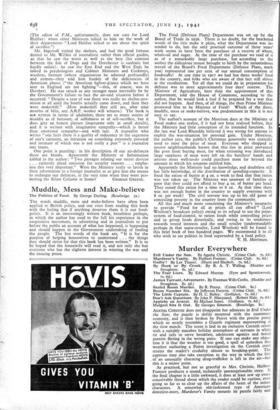Muddle, Mess and Make-believe
The Politics of Food. By George Darling. (Routledge. 58.) THE words muddle, mess and make-believe have often been applied to British policy, and. one rises from reading this book with the feeling that if anything deserves them it is our food- policy. It is an interestingly written book, breathless perhaps, in which the author has used to the full his experience in the cooperative movement, in advertising and in journalism to put before the public an account of what has happened, is happening and should happen in the Government undertaking of feeding the people. The last words of the book are, " It is for the purpose of helping housewives to understand . . the things they should strive for that this book has been written." It is to be hoped that the housewife will read it, and not only she but everyone who has the slightest interest in winning the war and the ensuing peace.
The Food (Defence Plans) Department was set up by the Board of Trade in 1936. There is no doubt, for the bracketed words of the title make it plain, what the Department was in- tended to do, but the only practical outcome of three years' work seems to have been the purchase of a reserve of wheat, whale-oil and sugar. At the time of the purchase we read of it as of a remarkably large purchase, but according to the author the ridiculous mouse brought to birth by the mountainous travail of the Board's Food Department (Defence Plans, mark you) represented one per cent. of our annual consumption of foodstuffs! At one time in 1917 we had but three weeks' food in the country, and folks who are aware of that fact still shiver at the recollection. Yet all that we could do in preparation for defence was to store approximately four days' reserve. The Minister of Agriculture, later ,than the appointment of this Department, told the House of Commons, according to the author, that he would look a fool if he prepared for a war that did not happen. And then, of all things, the then Prime Minister promoted him to be Minister of Food! Which of the three, muddle, mess or make-believe, was predominant in this it is not easy to say.
The author's account of the Morrison days at the Ministry of Food makes 'one realise, if it had not been realised before, that the Ministry had little conception of, its intended function. In the last war Lord Rhondda believed it was wrong for anyone to exploit the war-situation for personal gain. Under Morrison, the author says, the public's Christmas generosity was cynically used to raise the price of meat. Everyone who shopped in poorer neighbourhoods knows that this rise in price prevented the poor from buying meat, for when rationing was introduced large surpluses of meat were left on the butchers' hands and anyone more well-to-do could purchase meat far beyond the amount to which his coupons entitled him.
Apparently the Ministry had no knowledge, and doubtless still has little knowledge, of the distribution of spending-capacity. It fixed the ration of butter at 4 oz. a week to find that that ration was not taken up. The Ministry was unaware of families so poor that they could not afford to buy 4 oz. of butter per head. They raised this ration for a time to 8 oz. At that time there was not enough butter in the country to supply everyone with 8 oz. per week! The civil servant was up to his old game of concealing poverty in the country from the community.
All this and much more concerning the Ministry's incapacity to provide " Food for all at - prices all can afford " (Lord Woolton's broadcast policy) owing to its refusal to use the point- system of food-Control, to ration foods while controlling prices and to group foods dietetically, and owing to its tenderness towards vested interests and _the small retailer (understandable perhaps in that super-retailer, Lord Woolson) will be found in this brief book of two hundred pages. We recommend it to all who wish to see politics in food superseded.by a food policy.
'if. H. MorraAm.


























 Previous page
Previous page